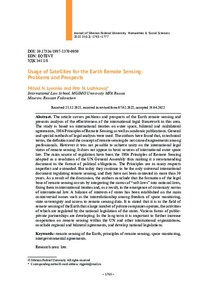Показать сокращенную информацию
Использование спутников для дистанционного зондирования Земли: проблемы и перспективы
| Автор | Лысенко, М. Н. | ru_RU |
| Автор | Ложковой, П. Н. | ru_RU |
| Автор | Lysenko, Mihail N. | en |
| Автор | Lozhkovoj, Petr N. | en |
| Дата внесения | 2022-10-28T02:03:38Z | |
| Дата, когда ресурс стал доступен | 2022-10-28T02:03:38Z | |
| Дата публикации | 2022-12 | |
| URI (для ссылок/цитирований) | https://elib.sfu-kras.ru/handle/2311/149629 | |
| Аннотация | Предметом исследования являются проблемы и перспективы дистанционного зондирования Земли, дан анализ эффективности международно-правовой базы в этой области. Использовались общие и специальные методы правового анализа. Основные результаты работы заключаются в доказательстве того, что с технической точки зрения определение и концепция дистанционного зондирования не вызывают разногласий среди профессионалов, но достичь единства по международно-правовому статусу дистанционного зондирования не удалось. Его нет в основных источниках международного космического права. Принципы дистанционного зондирования 1986 года во многих отношениях несовершенны и устарели, хотя и остаются единственным универсальным международным документом, регулирующим дистанционное зондирование, и не оспаривались более 30 лет. Установлен баланс интересов государств по основным спорным вопросам, таким как взаимосвязь между свободой космического мониторинга, государственным суверенитетом и доступом к данным дистанционного зондирования. Результаты практически значимы, так как могут служить основой новых нормативно-правовых актов международного уровня, в долгосрочной перспективе важно и дальше расширять сотрудничество в области дистанционного зондирования в рамках ООН и других международных организаций, заключать региональные и двусторонние соглашения и развивать национальное законодательство. Выводом исследования является положение, что формирование правовой базы дистанционного зондирования происходит путем интеграции норм «мягких законов» в национальные законы, закрепления их в международных договорах и, как следствие, появления норм обычного права и нормы международного права | ru_RU |
| Аннотация | The article covers problems and prospects of the Earth remote sensing and presents analysis of the effectiveness of the international legal framework in this area. The study is based on international treaties on outer space, bilateral and multilateral agreements, 1986 Principles of Remote Sensing, as well as academic publications. General and special methods of legal analysis were used. The authors have found that, in technical terms, the definition and the concept of remote sensing do not cause disagreements among professionals. However it was not possible to achieve unity on the international legal status of remote sensing. It does not appear in basic sources of international outer space law. The main source of regulation have been the 1986 Principles of Remote Sensing adopted as a resolution of the UN General Assembly thus making it a recommending document in the format of political obligations. The Principles are in many respects imperfect and outmoded. But today they continue to be the only universal international document regulating remote sensing, and they have not been contested in more than 30 years. As a result of the discussion, the authors conclude that the formation of the legal base of remote sensing occurs by integrating the norms of “soft laws” into national laws, fixing them in international treaties and, as a result, in the emergence of customary norms of international law. A balance of interests of states has been established on the main controversial issues such as the interrelationship among freedom of space monitoring, state sovereignty and access to remote sensing data. It is stated that it is in the field of remote sensing of the Earth that a large number of private companies operate, the activities of which are regulated by the national legislation of the states. Various forms of public-private partnerships are developing. In the long term it is important to further increase cooperation on remote sensing within the UN and other international organizations, conclude regional and bilateral agreements, and develop national legislations | en |
| Язык | ru | ru_RU |
| Издатель | Сибирский федеральный университет. Siberian Federal University | en |
| Тема | дистанционное зондирование Земли | ru_RU |
| Тема | принципы дистанционного зондирования | ru_RU |
| Тема | космический мониторинг | ru_RU |
| Тема | межправительственные соглашения | ru_RU |
| Тема | remote sensing of the Earth | en |
| Тема | principles of remote sensing | en |
| Тема | space monitoring | en |
| Тема | intergovernmental agreements | en |
| Название | Использование спутников для дистанционного зондирования Земли: проблемы и перспективы | ru_RU |
| Альтернативное название | Usage of Satellites for the Earth Remote Sensing: Problems and Prospects | en |
| Тип | Journal Article | ru_RU |
| Контакты автора | Лысенко, М. Н.: Международно-правовой факультет, МГИМО МИД России Российская Федерация, Москва | ru_RU |
| Контакты автора | Ложковой, П. Н.: Международно-правовой факультет, МГИМО МИД России Российская Федерация, Москва | ru_RU |
| Контакты автора | Lysenko, Mihail N.: International Law School, MGIMO University MFA Russia Moscow, Russian Federation | en |
| Контакты автора | Lozhkovoj, Petr N.: International Law School, MGIMO University MFA Russia Moscow, Russian Federation; rtgpetrr@mail.ru | en |
| Страницы | 1763–1777 | ru_RU |
| DOI | 10.17516/1997-1370-0950 | |
| Журнал | Журнал Сибирского федерального университета. Гуманитарные науки. Journal of Siberian Federal University. Humanities & Social Sciences; 2022 15 (12) | en |

